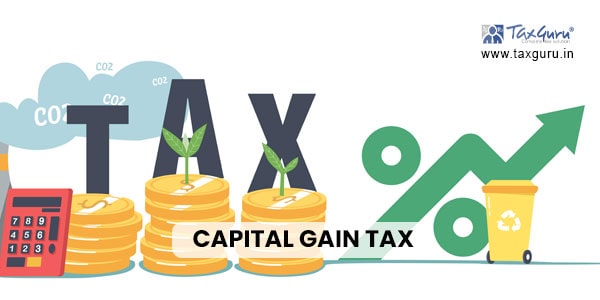Capital Gain Tax
Capital gain tax is a tax levied by the government on the profit earned from the sale or transfer of a capital asset. A capital asset refers to any property or asset that is owned by an individual or business, such as real estate, stocks, bonds, mutual funds, and so on.
There are two types of capital gains: long-term capital gains and short-term capital gains. Long-term capital gains are gains that arise from the sale of a capital asset that has been held for more than 24 months, while short-term capital gains are gains that arise from the sale of a capital asset that has been held for less than 24 months.
The tax rate for long-term capital gains is lower than that of short-term capital gains. In India, the long-term capital gain tax is currently 20% (with indexation benefit), while the short-term capital gain tax is taxed at the applicable slab rate for the individual.
Capital Gain exemptions
Here are some of the major types of capital gain exemptions available under the Income Tax Act, section wise:
1. Exemption on Long-term Capital Gains (LTCG) from Equity Shares and Equity Mutual Funds: Section 10(38) of the Income Tax Act provides for the exemption on long-term capital gains arising from the sale of equity shares or equity-oriented mutual funds held for more than 12 months.
2. Exemption on Long-term Capital Gains from Residential Property: Section 54 of the Income Tax Act provides for the exemption on long-term capital gains arising from the sale of a residential property by investing the proceeds in another residential property within the specified time limit.

3. Exemption on Long-term Capital Gains from Agricultural Land: Section 54B of the Income Tax Act provides for the exemption on long-term capital gains arising from the sale of agricultural land by investing the proceeds in another agricultural land within the specified time limit.
4. Exemption on Long-term Capital Gains from Bonds: Section 54EC of the Income Tax Act provides for the exemption on long-term capital gains arising from the sale of any long-term asset by investing the proceeds in specified bonds issued by National Highways Authority of India (NHAI) or Rural Electrification Corporation (REC) within the specified time limit.
5. Exemption on Long-term Capital Gains from any Other Assets: Section 54F of the Income Tax Act provides for the exemption on long-term capital gains arising from the sale of any asset other than a residential house property by investing the proceeds in purchasing or constructing a residential house property within the specified time limit.
6. Exemption on Short-term Capital Gains from Equity Shares and Equity Mutual Funds: Section 111A of the Income Tax Act provides for the exemption on short-term capital gains arising from the sale of equity shares or equity-oriented mutual funds held for up to 12 months, subject to certain conditions.
7. Exemption on Short-term Capital Gains from Other Assets: Section 54B of the Income Tax Act provides for the exemption on short-term capital gains arising from the sale of an agricultural land by investing the proceeds in another agricultural land within the specified time limit.
****
The author is an Income Tax and GST Practitioner and can be contacted at 9024915488.






What happens if we sell recently purchased or built property within three years and in accordance with the provision’s [net consideration- (cost of acquisition-capital gain exempted earlier)]? If my cost of acquisition is less than my capital gains and I claim the whole amount as an exemption earlier, am I now responsible for the full amount of the net consideration since my cost of acquisition is equal to the capital gains that were previously exempted?